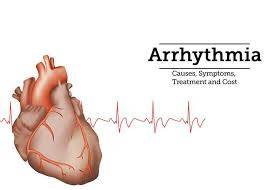Certainly, let's explore arrhythmias, including their causes, signs, effects, and solutions.
**Causes of Arrhythmias:**
1. Heart disease (e.g., coronary artery disease)
2. High blood pressure (hypertension)
3. Heart attack (myocardial infarction)
4. Heart valve disorders
5. Congenital heart defects
6. Aging
7. Diabetes
8. Sleep apnea
9. Hyperthyroidism
10. Hypothyroidism
11. Smoking
12. Excessive alcohol or caffeine consumption
13. Drug abuse (e.g., cocaine, amphetamines)
14. Medications
15. Emotional stress or anxiety
16. Electrolyte imbalances (e.g., low potassium or magnesium)
17. Fever or illness
18. Heart surgery complications
19. Chronic kidney disease
20. Genetics (family history)
**Signs and Symptoms of Arrhythmias:**
1. Palpitations (feeling of strong, fast, or irregular heartbeat)
2. Bradycardia (slow heartbeat)
3. Tachycardia (fast heartbeat)
4. Fluttering in the chest
5. Chest pain or discomfort
6. Dizziness or lightheadedness
7. Fainting (syncope)
8. Fatigue
9. Shortness of breath
10. Sweating
11. Weakness
12. Nausea
13. Feeling of impending doom
14. Pounding in the chest
15. Irregular pulse
16. Heart flutter or skipped beats
17. Chest tightness or pressure
18. Confusion or disorientation
19. Anxiety
20. Stroke (if arrhythmia causes blood clots)
**Effects of Arrhythmias:**
1. Reduced cardiac output
2. Fainting or loss of consciousness
3. Stroke
4. Blood clots
5. Heart failure
6. Cardiac arrest
7. Fatigue and weakness
8. Decreased exercise tolerance
9. Anxiety and mental health issues
10. Reduced quality of life
11. Increased risk of heart attack
12. Chest pain and discomfort
13. Hypotension (low blood pressure)
14. Cardiomyopathy
15. Ventricular fibrillation (life-threatening arrhythmia)
16. Hospitalizations
17. Risk of sudden death
18. Impaired organ and tissue perfusion
19. Frequent monitoring and doctor visits
20. Impact on daily activities and work
**Solutions and Management of Arrhythmias:**
1. Medications (e.g., anti-arrhythmics, beta-blockers)
2. Electrical cardioversion
3. Radiofrequency catheter ablation
4. Implantable devices (e.g., pacemakers, defibrillators)
5. Lifestyle changes (e.g., stress management, healthy diet)
6. Avoiding triggers (e.g., caffeine, alcohol, smoking)
7. Heart-healthy diet
8. Reducing emotional stress
9. Treating underlying causes (e.g., heart disease, thyroid disorders)
10. Electrolyte correction (e.g., potassium or magnesium supplements)
11. Medication adjustments for contributing conditions
12. Weight management
13. Avoiding illegal drugs
14. Treating infections or fever
15. Avoiding excessive alcohol
16. Regular follow-up with a cardiologist
17. Genetic testing and counseling (if hereditary)
18. Cardiac rehabilitation
19. Surgical procedures (e.g., maze procedure)
20. Education and support groups for coping with arrhythmias
The management of arrhythmias can vary significantly depending on the type and underlying causes, so consulting a healthcare professional is crucial for accurate diagnosis and tailored treatment.



No comments yet
Be the first to share your thoughts!